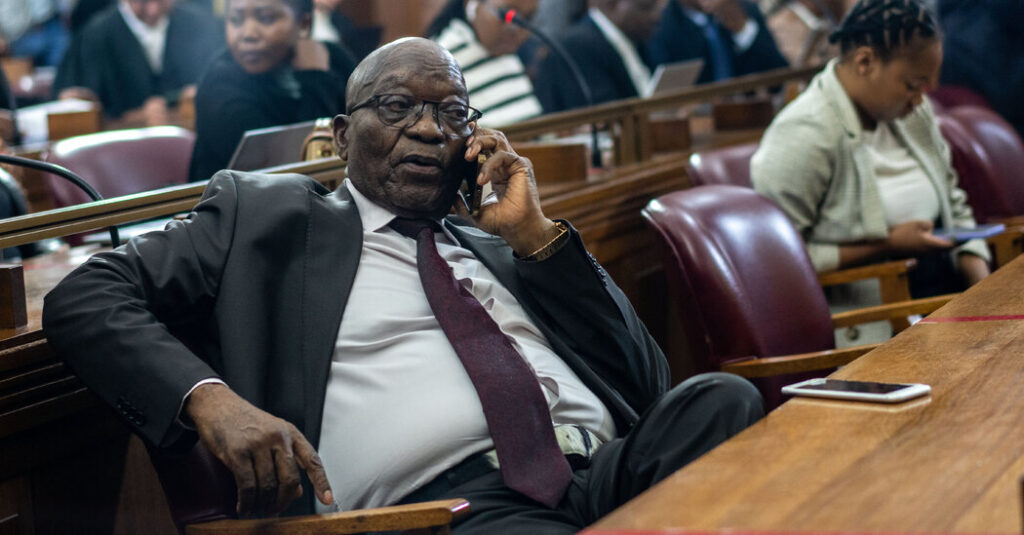For Mbalunle Mthethwa, a loyal follower of former South African President Jacob Zuma’s new political party, the official results of last month’s national election did not meet his expectations.
“The election was not free and fair,” she said, echoing claims made by Mr Zuma that the election was stolen. Ms Mthethwa is a 38-year-old chef who lives in a small town near the coastal city of Durban and has been unemployed for the past four years.
Mr Zuma, 82, whose nine years as president have been clouded by accusations of corruption and looting of state coffers, has taken a page from the playbook of populist leaders in recent years – particularly in the United States and Brazil.
Allegations of vote-rigging in other countries have led to chaos and South Africans will get their first look at how things might unfold on Friday, when Mr Zuma’s party, umkhonto wesizwe, known as MK, vows to boycott the first conference of the new South Africa. parliament.
The boycott will not prevent Parliament from achieving its goal for the day – electing a president and speaker. But it would provide the party with a high-profile stage to express its anger.
Zuma’s party actually exceeded the expectations of analysts and political opponents: winning nearly 15% of the vote nationwide, becoming the third largest party in parliament, and winning 45% in Zuma’s home province of KwaZulu-Natal of votes.
Nonetheless, Mr Zuma and his supporters claimed they won at least two-thirds of the vote, enough to amend the country’s constitution to pursue some of their proposed initiatives, although they provided no evidence. The moves would include allowing traditional minority leaders a role in parliament and paving the way for Zuma to return to the presidency.
Outside parliament, Zuma’s supporters say they will remain disciplined and await instructions from him on how to deal with a system they say is stacked against them.
The latest news of their dissatisfaction came on Wednesday night, when the country’s top court issued a brief four-page ruling rejecting MK’s application to prevent parliament from sitting.
The party argued that the new parliament should not be allowed to convene because the election results were in doubt. But the court said the party took too long to file its application and did not provide enough evidence to support its case.
MK’s electoral performance was unprecedented for a South African party contesting national and provincial elections for the first time in the post-apartheid era. That’s a big reason why Mr Zuma’s former party, the African National Congress, lost its absolute majority for the first time since taking power at the end of apartheid in 1994, although it still won more votes than any other party.
The ANC has invited all political parties to join the coalition that governs the country, with parties still negotiating on Thursday and facing a deadline to reach an agreement before a parliamentary session on Friday.
MK, named after the ANC’s armed wing during the anti-apartheid struggle, has flatly rejected the ANC. Great partnership building.
The extent of MK’s subversion of the ANC is most evident in KwaZulu-Natal communities, including Ms Mthewa’s town of Kwamahuta, a hilly, impoverished outpost just outside a tourist On the streets of the beach town.
Five years ago, the ANC won Ms Mthewa’s constituency with 76 per cent of the vote. This year, MK won with 75% of the vote. MK branch coordinator Ms Mthethwa said the MK branch in the region has about 5,000 members, most of whom have defected from the ANC.
Ms Mthethwa said she was not politically active and was not a real fan of Mr Zuma until she heard his speech at the MK launch in December. Her community faces high unemployment, water shortages, power outages and potholed roads that reflect the desperate state of a country.
“Some people, when they speak, they get your attention,” she said, adding that she believed Mr Zuma when he said “this party will save everyone living in South Africa”.
What resonates most in communities like Kwa Makhutha is MK’s message of fighting for the country’s black majority, which three decades after the end of apartheid still faces huge disparities in wealth, land ownership and other economic measures. Ms Mthewa said the best way for the party to endear itself to the community was by being good neighbours.
In an old animal pharmacy with exposed cinderblock walls in Kwamakuta on Wednesday, several MK volunteers folded their collection of clothes to donate to community members whose homes were destroyed in last week’s floods. On the road, several young people who now support Mr Zuma’s party sat next to an empty plot of land where they planned to plant a vegetable garden for the community after it was cleared.
“The vision of the MK Party is to restore the dignity of black people,” said 21-year-old Stanbela Khuzwayo, who embraced the new party despite coming from a family of ANC activists.
Mr Kuzwayo, who worked as a polling station monitor on election day, also believes his party was robbed. He said the party was still trying to find ways to challenge the official results, but if that was not possible, it would be prudent to take 58 seats in the 400-member parliament.
“You can’t bring about any change without the participation of our members of Parliament,” he said.

